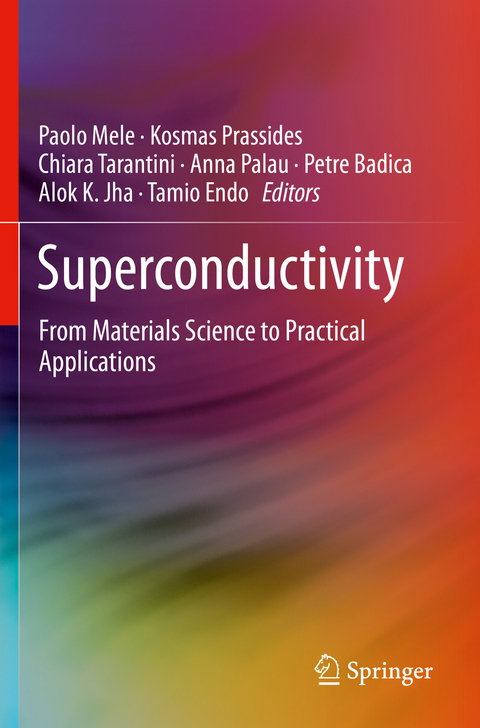
Superconductivity
Springer International Publishing (Verlag)
978-3-030-23305-1 (ISBN)
This book provides readers with a comprehensive overview of the science of superconducting materials. It serves as a fundamental information source on the actual techniques and methodologies involved in superconducting materials growth, characterization and processing. This book includes coverage of several categories of medium and high-temperature superconducting materials: cuprate oxides, borides, and iron-based chalcogenides and pnictides.
- Provides a single-source reference on superconducting materials growth, characterization and processing;
- Bridges the gap between materials science and applications of superconductors;
- Discusses several categories of superconducting materials such as cuprate oxides, borides, and iron-based chalcogenides and pnictides;
- Covers synthesis, characterization, and processing of superconducting materials, as well as the nanoengineering approach to tailor the properties of the used materials at the nanoscale level.
lt;p>Paolo Mele is currently Professor at SIT Research laboratories, Shibaura Institute of Technology, Tokyo, Japan.. He obtained a Master degree in Chemistry and Ph.D. in Chemical Sciences at Genova University (Italy). In 2003 he moved to ISTEC-SRL in Tokyo to study melt-textured ceramic superconductors. Then he worked as postdoc at Kyoto University (JSPS fellowship) from 2004 to 2007, at Kyushu Institute of Technology (JST fellowship) from 2007 to 2011, at Hiroshima University (as lecturer) from 2011 to 2014 and at Muroran Institute of Technology (as associate professor) from 2015 to 2018 before reaching his current position. His research interests include materials for energy and sustainable development (superconductors and thermoelectrics); fabrication and characterization of thin films of oxides, ceramics and metals; study of the effect of nanostructuration on the physical properties; thermal transport; and vortex matter. He is the author of more than 100 papers in international scientific journals and four book chapters, and has two patents and has contributed to hundreds of communications at international conferences. He edited three books for Springer.
Kosmas Prassides was born in Kavala, Greece and read Chemistry at Oxford University where he also completed his doctoral research on inorganic mixed valency compounds under the supervision of Professor P. Day FRS. He was then the Drapers' Research Fellow at St. Anne's College, Oxford, working closely with Professor P. N. Schatz (University of Virginia) on the development of the PKS theoretical model for mixed valency systems. Following a spell as Assistant Professor of Chemistry at the University of Crete, Greece, he returned in 1989 to the UK at the University of Sussex where he remained until 2004 and he was successively Lecturer, Reader and Professor of Solid State Chemistry. In 2005, he took up a Chair in Materials Chemistry at the Department of Chemistry, Durham University. In October 2014, he relocated to Japan as a Professor at Tohoku University and Principal Investigator at the Advanced Institute for Materials Research (WPI-AIMR). In October 2018, he accepted a Chair in Materials Science at the Graduate School of Engineering, Osaka Prefecture University. His research interests are multi-disciplinary and encompass a range of structural, magnetic and electronic problems in modern materials, straddling the areas of condensed matter physics and chemistry. His primary focus is currently on the study of strongly correlated electron systems, which typically display remarkable electronic properties that challenge existing theory for satisfactory explanations. The delicate balance between localised and itinerant behaviour related to the strongly correlated nature of the systems and the metallic, insulating and superconducting states lie at the heart of his ongoing research. He has been using core chemical approaches to access unusual structures and electronic, conducting and magnetic ground states and probe the physics in key materials, especially metal fulleride solids. He has advanced the understanding of molecular superconductivity and magnetism and the generic problem of the metal-Mott insulator transition, unveiling the fullerides as model members of the high-Tc superconductivity family, potentially holding the key to the understanding of the pre-requisites for high-Tc superconductivity when electron correlation is important.
Chiara Tarantini is a staff research faculty member of the Applied Superconductivity Center at the National High Magnetic Field Laboratory, Florida State University in Tallahassee, Florida, USA. She was trained as a condensed matter physicist at the University of Genoa, Italy, and obtained her PhD in 2007. Her research activities have been focused on the investigation of numerous superconducting materials, such as MgB2, Nb3Sn and other A15 phases, Fe-based superconductors and YBa2Cu3O7-_. Her interests span fro
Targeted selection and characterisation of contemporary HTS wires for specific applications.- Pinning efficiency of artificial pinning centers in superconductor nanocomposite films.- Control of vortex pinning in YBCO thin films by incorporating APCs through surface modified target approach.- Progress in thick film 2G-HTS development.- Superconducting YBa2Cu3O7-d Nanocomposite Films Using Preformed ZrO2 Nanocrystals via Chemical Solution Deposition.- High vortex activation energies in the AC magnetic response of superconductors close to the DC irreversibility line.- An atomic-scale perspective of the challenging microstructure of YBa2Cu3O7-x thin films.- Growth, properties, and device fabrication of iron-based superconductor thin-films.- Future potentials of new high Tc iron based superconductors.- Grain boundaries in Fe-based superconductors.- Control of the critical current density through microstructural design by Ho2O3 and Te co-addition into MgB2 processed by ex situ spark plasma sintering.- Superconductivity in the two dimensional electron gas at transition metal oxide interfaces.- Prospects of superconducting magnet technology in the medical field: a new paradigm on the horizon?.
| Erscheinungsdatum | 08.09.2020 |
|---|---|
| Zusatzinfo | XVII, 369 p. 195 illus., 151 illus. in color. |
| Verlagsort | Cham |
| Sprache | englisch |
| Maße | 155 x 235 mm |
| Gewicht | 593 g |
| Themenwelt | Naturwissenschaften ► Physik / Astronomie ► Elektrodynamik |
| Technik ► Maschinenbau | |
| Schlagworte | cuprate oxides • iron based superconductors • Maglev • Oxide Thin Films, Multilayers and Nanocomposites • superconducting materials |
| ISBN-10 | 3-030-23305-7 / 3030233057 |
| ISBN-13 | 978-3-030-23305-1 / 9783030233051 |
| Zustand | Neuware |
| Haben Sie eine Frage zum Produkt? |
aus dem Bereich


